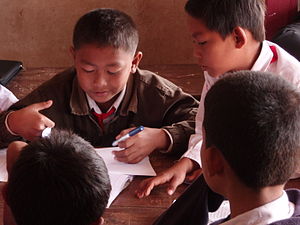Attention deficit-hyperactivity disorder
| Attention deficit hyperactivity disorder | |
|---|---|
| Synonyms | Attention deficit disorder, hyperkinetic disorder (ICD-10) |
 |
|
| Children with ADHD may find it more difficult to focus and to complete their schoolwork. | |
| Specialty | Psychiatry |
| Symptoms | Problems paying attention, excessive activity, difficulty controlling behavior |
| Usual onset | Before age 6–12 |
| Duration | >6 months |
| Causes | Unknown |
| Treatment | Counseling, lifestyle changes, medications |
| Frequency | 51.1 million (2015) |
| Classification | |
|---|---|
| External resources |
Attention deficit hyperactivity disorder (ADHD) is a mental disorder of the neurodevelopmental type. It is characterized by problems paying attention, excessive activity, or difficulty controlling behavior which is not appropriate for a person's age. These symptoms begin by age six to twelve, are present for more than six months, and cause problems in at least two settings (such as school, home, or recreational activities). In children, problems paying attention may result in poor school performance. Although it causes impairment, particularly in modern society, many children with ADHD have a good attention span for tasks they find interesting.
Despite being the most commonly studied and diagnosed mental disorder in children and adolescents, the exact cause is unknown in the majority of cases. It affects about 5–7% of children when diagnosed via the DSM-IV criteria and 1–2% when diagnosed via the ICD-10 criteria. As of 2015 it is estimated to affect about 51.1 million people. Rates are similar between countries and depend mostly on how it is diagnosed. ADHD is diagnosed approximately three times more often in boys than in girls, although the disorder is often overlooked in girls due to their symptoms differing from those of boys. About 30–50% of people diagnosed in childhood continue to have symptoms into adulthood and between 2–5% of adults have the condition. The condition can be difficult to tell apart from other disorders, as well as to distinguish from high levels of activity that are still within the normal-range.
ADHD management recommendations vary by country and usually involve some combination of counseling, lifestyle changes, and medications. The British guideline only recommends medications as a first-line treatment in children who have severe symptoms and for medication to be considered in those with moderate symptoms who either refuse or fail to improve with counseling, though for adults medications are a first-line treatment. Canadian and American guidelines recommend that medications and behavioral therapy be used together as a first-line therapy, except in preschool-aged children. Stimulant medication therapy is not recommended as a first-line therapy in preschool-aged children in either guideline. Treatment with stimulants is effective for up to 14 months; however, its long term effectiveness is unclear. Adolescents and adults tend to develop coping skills which make up for some or all of their impairments.
...
Wikipedia
